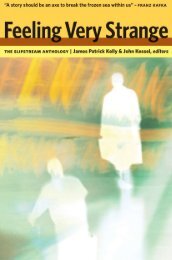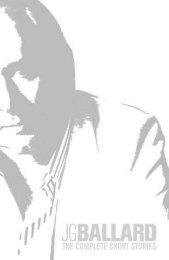The Curse of the Wer.. - Site de Thomas - Free
The Curse of the Wer.. - Site de Thomas - Free
The Curse of the Wer.. - Site de Thomas - Free
Create successful ePaper yourself
Turn your PDF publications into a flip-book with our unique Google optimized e-Paper software.
20 THE CURSE OF THE WEREWOLF<br />
For <strong>the</strong> growing number <strong>of</strong> scholars engaged in <strong>the</strong> study <strong>of</strong> myth<br />
and folklore, <strong>the</strong> approach recommen<strong>de</strong>d by Ranke and Comte seemed<br />
increasingly attractive. As Richard Dorson <strong>de</strong>monstrates in <strong>The</strong> British<br />
Folklorists: A History, <strong>the</strong> romantic writers’ enthusiasm for <strong>the</strong><br />
inspirational myths and legends <strong>of</strong> antiquity sha<strong>de</strong>d into a more empiricist<br />
approach to <strong>the</strong> collection and analysis <strong>of</strong> such material as<br />
<strong>the</strong> nineteenth century advanced. Scott’s publication <strong>of</strong> his Letters<br />
on Demonology and Witchcraft at <strong>the</strong> end <strong>of</strong> a successful career as a<br />
writer <strong>of</strong> historical novels exemplifies this progression, although it also<br />
points to <strong>the</strong> mixture <strong>of</strong> rationalism and romanticism which influenced<br />
<strong>the</strong> study <strong>of</strong> myth and folklore, since it is unlikely that Scott’s foray<br />
into empirical research signalled his wholesale abandonment <strong>of</strong> <strong>the</strong><br />
romantic principles which had shaped his work as a novelist. In<strong>de</strong>ed,<br />
<strong>the</strong> literary flourishes that ma<strong>de</strong> him a popular novelist are also a<br />
feature <strong>of</strong> his scholarly treatise, and in this sense his use <strong>of</strong> language is<br />
a clear indication <strong>of</strong> his commitment to both intellectual paradigms.<br />
Scott’s study inclu<strong>de</strong>d a short passage on lycanthropy, which drew<br />
from a variety <strong>of</strong> texts on <strong>the</strong> subject from <strong>the</strong> sixteenth and seventeenth<br />
centuries, an inclusion which generated fur<strong>the</strong>r interest in<br />
<strong>the</strong> genealogy <strong>of</strong> <strong>the</strong> werewolf. Just two years after <strong>the</strong> publication<br />
<strong>of</strong> Letters on Demonology and Witchcraft, a poem that had been<br />
translated from French into English in <strong>the</strong> thirteenth century was<br />
unear<strong>the</strong>d, edited and published with an explanatory introduction and<br />
glossary — a production that also reflected <strong>the</strong> growth <strong>of</strong> interest in<br />
medieval history that Scott had helped to engen<strong>de</strong>r. This edition <strong>of</strong><br />
<strong>the</strong> poem was entitled William and <strong>the</strong> <strong>Wer</strong>wolf, although subsequent<br />
editions have used <strong>the</strong> more accurate translation <strong>The</strong> Romance <strong>of</strong><br />
William <strong>of</strong> Palerne. Although <strong>the</strong> werewolf in <strong>the</strong> story is benevolent,<br />
<strong>the</strong> title page <strong>of</strong> <strong>the</strong> first mo<strong>de</strong>rn edition <strong>de</strong>picts a woodcut <strong>of</strong> a<br />
werewolf attacking a child (Figure 1). <strong>The</strong> use <strong>of</strong> this picture, as well<br />
as <strong>the</strong> adaptation <strong>of</strong> <strong>the</strong> title to inclu<strong>de</strong> <strong>the</strong> word ‘werewolf’, conflicts<br />
with <strong>the</strong> more sober approach articulated in <strong>the</strong> introductory notes,<br />
presenting ano<strong>the</strong>r instance in which <strong>the</strong> empirical impulse to present<br />
‘<strong>the</strong> facts’ colli<strong>de</strong>d with <strong>the</strong> <strong>de</strong>sire to allow <strong>the</strong> poetic imagination<br />
free rein.





